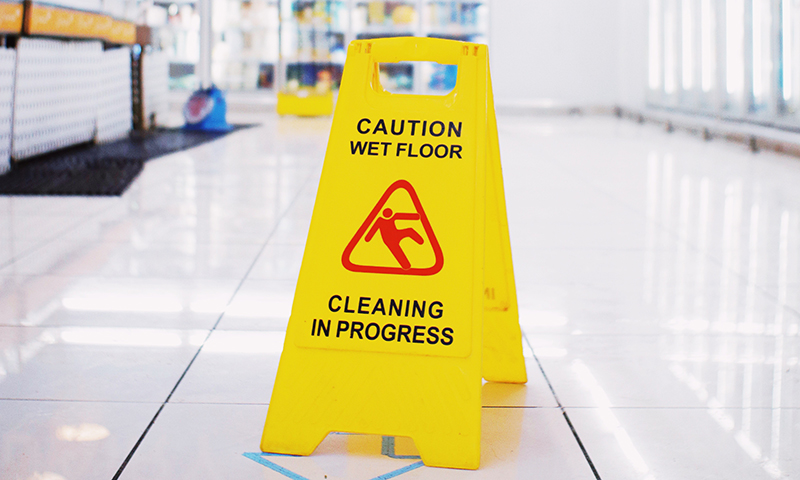
Navigating Store Liability: When Is a Store Liable for a Customer Injury?
At Miley Legal, we understand that accidents happen, and when they do, it’s crucial to have the guidance of a trusted legal ally. If you’ve been injured in a store or on someone’s property, you may be wondering if you have a valid personal injury claim. Our experienced team is here to provide the answers and support you need during this challenging time. As your dedicated West Virginia premises liability lawyer, we’re committed to helping you navigate your case. Let us help you hold the store liable for your injury.
Contact us today for a free initial consultation.
Storeowners’ Duty of Care
As property owners, storeowners have a legal obligation to ensure their premises’ safety, particularly for their customers’ benefit. This responsibility, often called the “duty of care,” extends to maintaining the property in a condition free from hazards. Whether you’re in a retail store, a supermarket, or any other commercial establishment, store owners must exercise reasonable care in preventing accidents. Negligence on the part of the store or property owner, such as overlooking a hazard or failing to address unsafe conditions promptly, can lead to serious injuries.
If you believe a store’s negligence played a role in your injury, it’s essential to understand your rights and the potential for a personal injury claim. Storeowners’ duty of care is a critical element in premises liability cases, and an experienced personal injury lawyer can help you navigate this aspect of your claim effectively.
Elements of a Premises Liability Claim
When pursuing a premises liability claim, it’s vital to establish specific elements to demonstrate the store or property owner’s negligence. Your legal status at the time of the incident plays a significant role, whether you were a non-trespasser or a trespasser. Next, proving negligence and foreseeability is crucial, showing that the store or property owner may be liable for a customer injury due to their failure to exercise reasonable care. Finally, you must establish a clear link between the hazardous condition created by the store or property owner’s negligence and your injury. This connection is essential for a successful personal injury case in which you may be able to seek a settlement.
Common Types of Injuries in Stores
In retail establishments, accidents can take various forms, leading to personal injury claims. Among the most frequent incidents are slip and fall accidents, often caused by wet or slippery floors, uneven surfaces, or debris. Falling merchandise incidents can also occur due to poorly stacked or unstable displays. Additionally, inadequate security measures can lead to injuries resulting from criminal acts on the premises. Whether it’s head injuries, broken bones, or other harm, suffering an injury in a store can result in medical bills, lost wages, and significant pain and suffering.
Remember to report your slip and fall accident to get started on your claim.
When Can a Store Be Held Liable for a Customer Injury?
Understanding when a store can be held liable for a customer injury is crucial for anyone who has suffered harm while shopping or visiting a commercial property. Storeowners and property owners have a legal duty of care to maintain a safe environment. If their negligence, such as failing to address hazards or provide adequate security, leads to an injury, they may be held liable.
If you believe you have a valid personal injury claim, our West Virginia premises liability lawyer can assess your case during a free case review and help you pursue the compensation you deserve.
Defenses Against Store Liability
One common defense against store liability claims is the “open and obvious” defense. This argument asserts that if a hazard on the premises was clearly visible and easily noticeable to a reasonable person, the storeowner may not be held liable for injuries resulting from that hazard. In such cases, it is argued that individuals should exercise their own judgment and take precautions when encountering obvious dangers. The effectiveness of this defense can vary by jurisdiction and the specific circumstances of the case, but it remains a key strategy for storeowners to contest premises liability claims.
Navigating these defenses can be challenging, and it’s essential to consult a West Virginia accident attorney experienced in premises liability cases. They can help you counter these arguments and build a solid case to pursue the compensation you deserve for your injuries, medical bills, lost wages, and more.
Contact Miley Legal Today
Understanding store liability for customer injuries is important when seeking justice and compensation. Storeowners hold a duty of care to provide a safe shopping environment, and when they fail in this responsibility due to negligence, you may have a valid personal injury claim. Our West Virginia premises liability lawyer at Miley Legal is here to be your advocate, guiding you through your case. Don’t let injuries, medical bills, and lost wages burden you.
Contact us today for a free case review, and let us fight for your rights, ensuring you receive the financial compensation you deserve. Your well-being is our priority, and we’re here to help you on your path to recovery.

